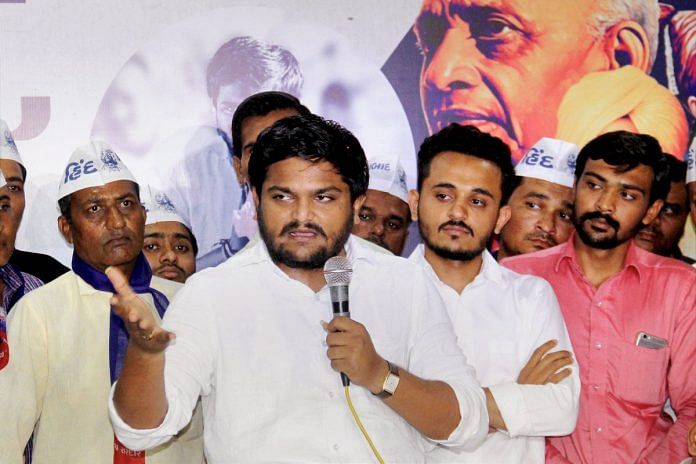The ‘local’ was subsumed under the constructed image of ‘Gujarat.’ This election reminds us how regions are not mere take-off points.
While Gujarat is on the verge of one of its most decisive elections, anger is palpable and so is devotion towards Narendra Modi. Which of the two will turn out to be a more powerful agent of transformation?
For once, a full-throated victory of BJP is not a forgone conclusion, a fact evident now even through speculations made by bookies and their colourful WhatsApp message titled “Satta Bazaar on Gujarat Election”.
In fact, WhatsApp groups – and especially the political videos that are being shared — provide in this election a fertile site of inquiry. They represent in themselves universes that create and disrupt social meanings. The relationship they have with official videos sponsored by the Congress and BJP may be discontinuous. But the circulation and interpretation of videos make the discourse more complex.
This form of social media has yet to be noticed for the significance it holds. But even the traditional forms of campaigns such as rallies and speeches have not been subjected to the analyses they deserve. Cacophonous references to ‘he said, she said’ and Twitter-wars are abundant, but some of the more subtle indications of how collectives such as samaj, desh, rajya get redefined at this moment require some examination.
For instance, the videos of speeches of Hardik Patel bring back our attention to the small and local, and its agency in making the trans-local.
In his speech in Surat on 3 December, Hardik was greeted by teeming listeners. Like all his public addresses, this one also began by exhorting the crowd to hail Sardar Patel as the deity and master of the Patel community. The invocation to Patel, both as a member of the Patidar community and the Congress, and most importantly for his concern for farmers is only appropriate and just. The appellation of “chhote sardar” deployed by the BJP for Narendra Modi is rendered obsolete through this gesture of the Patidar Anamat Andolan Samiti convener.
Hardik has also intervened in the assumed linearity of BJP’s evolution from Gujarat to the Centre, by reminding how much damage has been done in rural Gujarat. Tropes of sacrifice of 14 Patidar young men subjected to violence during the agitation, the suffering of widowed wives and son-deprived mothers also add the necessary memory and emotional charge to someone who is speaking to a specific samaj with a specific set of issues at hand.
His recurring lines, ‘Hun mudda nee vaat karu chhu,” (I only talk of issues) finds resonance among his followers, for he laid out (in Surat) the reasons why lakhs of Patels had to leave their native habitation in Amreli and Bhavnagar to live the life they do in Surat.
“Is there anyone who earns more than Rs 25,000,” he asks.
Nobody raises a hand.
Knowing fully how entrenched and historical the BJP-Patidar relation has been, Hardik and his followers do not make tall claims about pinning hopes on the Congress. Their logic is simple, we brought this government to power, we will now give another government a chance. And if that doesn’t work, we can always bring the BJP back after five years.
For the moment, sentiments run high on BJP’s negligence and gross injustice, as well as “atyachaar” on the community.
The voices of Alpesh Thakor and Jignesh Mevani sound more real, in comparison to the videos endorsing Modi that appear done up, and contrived.
Pre-empting all the criticism leveled against Modi, the BJP videos typically employ a group of three or four young men, sitting around at the river front, chatting ‘aimlessly’ on railway stations and barber shops. They begin by mentioning the cynicism of some against the BJP. This is then rebutted in a sarcastic harangue by an eloquent individual who enumerates the tough decisions Modi takes, the sacrifices he makes and how the rest are bent upon dividing the nation, just as the British did.
Each video ends with the entranced audience asking this individual of his identity, which he answers by saying: Hun chhu Vikaas, Hun Chhu Gujarat (I am development, I am Gujarat).
The BJP’s rhetoric has achieved a neat conflation between the local and the national, self and non-self, past and present, and representation and promise. It has homogenised the region and positioned the region to be merely a stepping stone for larger ambitions. In doing so, it has clearly shown a naivete towards local complexities and identitarian politics, and when occasions arose, it dealt with it in a high-handed manner.
In its desire to showcase Gujarat’s vibrancy, it forgot some of the traditional bastions of economy and power. The ‘local’ was assumed to be subsumed under the constructed image of ‘Gujarat,’ and this election reminds us how regions are not mere take-off points, they are discursive and forever-in-the-making.
Rita Kothari is a scholar based in Gujarat.



